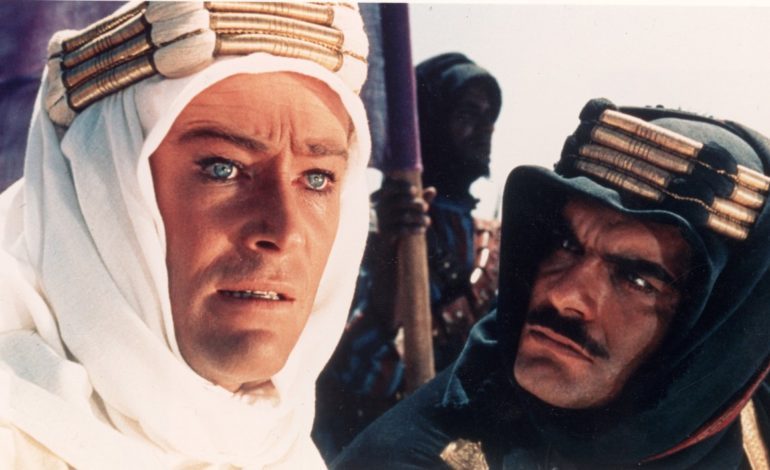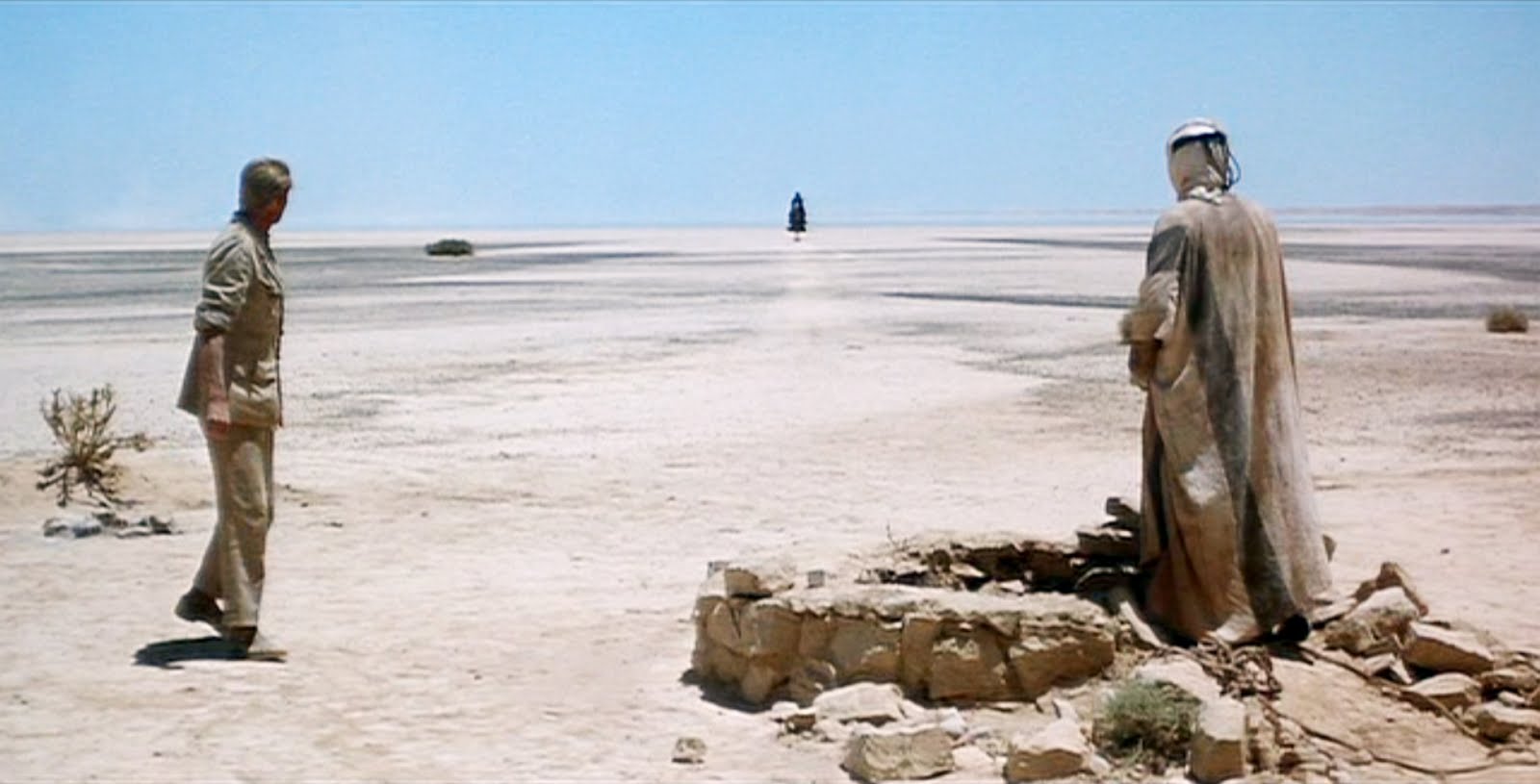

How does one describe a truly epic experience?
There are films that are enjoyable and allow excellent escapism, and then there are films that inspire beyond all measure. Gone with the Wind, Metropolis and Se7en are some of those movies that have inspired me and now I can add another film to my list: Lawrence of Arabia! A glorious, astounding and truly memorable experience that still packs quite a punch after all these years! So, why is this movie considered one of the “best films ever made?” How is it still impactful to this day? And for the newcomers, why should you see this movie?
The Story
Released in 1962, Lawerance of Arabia tells the story of T.E. Lawrence, a British officer stationed in Cairo during the height of World War I. Upon orders from his commanding officer and subsequent knowledge of the Bedouin tribes, Lawrence is sent to Arabia to locate Prince Faisal and learns of what’s to be done between the Arabic people and the reigning Turks who occupy the country. It’s a fascinating story because this really happened.
Lawrence (Peter O’ Toole’s first major role) travels to the desolate land of Arabia, where the Sun is always shining, the land is barren and death is almost certain if trouble should come to you. Director David Lean has of way of bringing the audience along for the ride especially in the desert scenes. While they may feel overlong for some, I felt that the extended amount of time given to this journey was something the audience needed to feel. Sure, it could be tedious to some but the point is made clear.
During his travels, Lawrence meets a man named Sherif Ali (in a commanding performance by Omar Sharif). This character never existed but acts as a combination of numerous other Arab leaders that Lawrence did meet during his time in Arabia. This friendship and struggle together offer wonderful scenes to watch simply because these two men, who come from different parts of the world, must understand each other to not only complete their mission, but also survive.
Once Lawrence finally meets up with Prince Faisal (Alec Guinness), we learn that he plans to lead a revolt against the Turks who’ve ruled the land in the hopes of bringing independence and freedom to the Arabic people. It drove me nuts trying to recognize Guinness as Faisal, but his performance is fabulous here and, reading into the production notes, he was even mistaken for the late Prince by people in Jordan (where most of the movie was filmed). Guinness is most famous for his role as Obi-Wan Kenobi in the original Star Wars trilogy so I knew I recognized him from somewhere!
I don’t want to talk too much about the film’s plot, as it’s quite massive. Lawrence of Arabia is almost four hours in length and, when I saw it in theaters, the film was kind enough to include a nice fifteen-minute intermission. Now, this was my first time seeing the film and I waited specifically to see it in theaters. There wasn’t a big crowd, as the theater only seated about fifty people but I counted roughly fifteen to twenty in attendance. They were mostly older folks so it’s safe to assume that I was the youngest person under thirty-five.
My first impressions of Lawrence were simply “wow.” It reminded me a lot of Indiana Jones, which, given Steven Spielberg’s love for the film, likely drew inspiration from its movie’s aesthetics. I enjoyed the slow pace, attention to character development and those impressive battle sequence. Remember this was released during the 1960’s, so the violence shown is more heavily implied instead of graphically shown (something I prefer to watch). I also enjoyed the many themes expressed throughout this film.
Themes
Prior to seeing Lawrence of Arabia, I did some reading on Lawrence and found him a truly fascinating person to study. He was a fluent in reading and speaking Arabic. He also traveled to Syria where he studied archeology starting in 1911. Sadly, none of those things are talked about in the movie. Yes, I’m well aware the film is very long, but I don’t mind watching a long feature so long as it’s interesting.
The movie focuses on the campaign of the Arabic and Bedouin tribes in their fights against the Turks. Normally when we think of World War I, we think of trench warfare fought between the Germans and British armies, whereas the Middle East fight isn’t talked about as much. For me, I felt that the film was too focused on this part of Lawrence’s life and would’ve liked to see more.
During his time in the desert, Lawrence comes to understand the Arabic people. Their language, their customs, their way of life and even wears their clothing. Being a British officer, he was under orders and decided to break them in order to lead them in their attacks against the Turks. When he travels the desert and leads his men into battle, death is certainly guaranteed. There are several moments of violence in the film that are rather shocking to watch. Not simply because of what’s implied but more or less, the consequences of those actions.


This is where we see the effects of shellshock overcome Lawrence. Sure, shellshock was a term used to describe the constant barrage of artillery during World War I- later renamed PTSD- but Lawrence experiences something that he has neither seen nor done before. Imagine spending a great deal of time with someone and suddenly that person dies or your forced to make a decision? It’s something that’ll stay with you forever.
Another great moment is when Lawrence arrives back in Cairo wearing the garments of the Arabic people. The British are shocked but Lawrence sees himself as one of them. They are fighting for a common goal and he requests food, supplies, guns and even artillery for his campaign to drive the Turks out. He’s granted everything except the artillery because “that could give them freedom.” The underlying tone is clear and, although film Lawrence is unaware of the Sykes-Picot Agreement, in reality he was.
Impact
The story of T.E. Lawrence can’t be simply told. It’s a massive story that spreads all over the Middle East, the desert and even the Turk-occupied shores. Overall, the film does a good enough job of telling its story but a lot of critics have questioned its historical accuracy. Personally, I don’t depend on movies to be fully accurate but at least it’s enough to keep me interested in reading more about Lawrence’s life.
Lawrence of Arabia shot Peter O’Toole to international fame and, if you look closely, he does somewhat resemble the real T.E. Lawrence himself. Several directors have cited this movie as an inspiration for their films, which include Indiana Jones, Star Wars, Dune, Prometheus and even Frozen. It was a film that took us to another time of conflict, an unknown world and the experience of learning about a new culture and different people than we normally see.
Lawrence simply wanted to get the freedom that these people deserved. Yes, the Turks were eventually driven out, but there are still problems even to this day. One man may not change the world or even the thought of others, but he’ll be remembered for what he accomplished by taking the first step.
A sequel to this film was actually made in 1990, starring Ralph Fiennes as the titular character. It’s a surprisingly good film that answers a lot of questions that David Lean’s film left us asking.
Conclusion
If you haven’t seen Lawrence of Arabia, I urge you to do so when you have the chance. It’s a film that grabs your attention right from the start. From the opening music, to the gorgeous cinematography, the brilliant performances and well-written script make for an exceptional moviegoing experience. Sure, I would’ve wanted more out of the protagonist’s backstory but that’s just me. Because the film is focused on Lawrence’s time in the Middle East, it occasionally felt tedious but I was nevertheless enthralled at observing this narrative on the big screen.
One thing is certain though: there aren’t many movies of this grand scope today. The slow pace takes us to this desert that characters once traveled through. Many fought there, died there and lived to tell their story. It took an outsider, a man willing to listen, to make a difference. Sure, the end goal was achieved but the oppression is still a common topic to read about in the news.
For the young crowd, Lawrence of Arabia is the reason to watch an adventure movie. From the landscapes, sets and great characters, this movie sparks with amazement. It won numerous awards and has sealed its place in film history. Despite certain elements being largely fictionalized, that shouldn’t stop you from watching and reading about Lawrence’s life after the curtain closes.
It’s a film that I still think about even now. I wonder to myself if I could make the journey that Lawrence undertook. Would I be able to survive the harsh conditions of the desert? And in a time of war, how would I as a person change? Lawrence of Arabia is stellar, epic and a true masterpiece that remains unforgettable fifty-seven years later.
